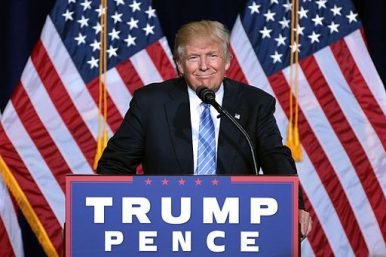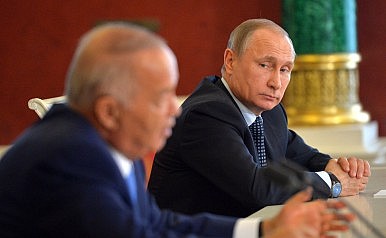Beyond Trump and Putin: The American Alt-Right's Love of the Kremlin’s Policies The Kremlin has various links with leading far-right figures undergirding Trump’s candidacy.By Casey Michel
The Kremlin has various links with leading far-right figures undergirding Trump’s candidacy.By Casey Michel
October 13, 2016 In late August, in a speech delineating white nationalist support for Donald Trump, Democratic presidential nominee Hillary Clinton unveiled a new title for Russian President Vladimir Putin: “The Grand Godfather of Extreme Nationalism.” With the sinecure, Clinton sought to directly link the odious policies of her Republican counterpart — namely, mainstreaming a racialized, white supremacist discourse the United States had not seen at such levels in a generation — to those brought to bear under Putin’s third term.
The epithet built upon one of the pillars of Clinton’s campaign which, in turn, built upon the primary campaign of former GOP contender, and current Ohio governor, John Kasich. That is, in addition to Trump’s outright praise for Putin’s leadership, as well as his murky, secretive financial ties to those close to the Kremlin, Clinton tied Trump to the Kremlin’s campaign of stoking hyper-nationalistic movements throughout the West.
As a rhetorical device, the title remains a flurry of brilliance. Not only does the terminology help highlight the Kremlin’s kleptocratic coterie — with Putin as don, as mafioso — but it also further emphasized Clinton’s grasp of Moscow’s policies, and the motivations therein. As seen with Hungary’s Jobbik, with France’s National Front, with Greece’s Golden Dawn, those far-right movements sprouting throughout Europe have found a counterpart in Trump’s hostile takeover of the Republican Party. And much as Trump has aped the rotted, regressive policies of Putin-friendly leaders throughout Europe — see: Hungary’s Viktor Orban — so, too, has he helped give a national platform to the groups and movements that have not only fueled a resurgence of white nationalism in the United States, but who have gone out of their way to praise, of all international leaders, Putin. These groups, as noted in Clinton’s speech, include the “alt-right,” a gathering of fascists and white nationalists who would Balkanize the United States or who would return the country to a bygone era of white supremacy, but also extend to the secessionists and Christian fundamentalists further propping Trump’s campaign.
Of course, certain critics of Clinton, ranging from Trumpian outlets like Breitbart to lefty journalists with little grasp on post-Soviet developments, tabbed her speech as conspiratorial, or as baseless fear-mongering. But those voices overlook the breadth of evidence linking American far-right groups to Kremlin-friendly policies, and in certain cases directly to Kremlin financing. While the phenomena of fascistic, hard-right support for Moscow within Europe has been well-documented elsewhere, most especially by Anton Shekhovtsov and Alina Polyakova, among others, the parallel networks and linkages within the United States have seen depressingly little coverage. Indeed, while “praise of Putin by [Europe’s] far-right leaders” becomes “commonplace,” as Polyakova wrote, so, too, has the pro-Kremlin fealty from far-right leaders in America, almost all of whom uniformly back Trump.
It doesn’t take much work to follow a trendline threading the Kremlin, most especially under Putin’s third term, directly to the leading far-right figures undergirding Trump’s candidacy. Take, for instance, Matthew Heimbach, tabbed by ThinkProgress as the “most important white supremacist of 2016.” The founder of the Traditionalist Worker Party and an unabashed anti-Semite, Heimbach espouses views not even Trump has deigned to offer, including the removal of birthright citizenship and the creation of white ethno-states. (The Southern Poverty Law Center has described Heimbach as “The Little Fuhrer.”) Heimbach has become one of the leading voices behind the expansion of the “alt-right” Clinton detailed. In a recent rundown of the “alt-right’s” main proponents, Yahoo! offered Heimbach top billing.
While Heimbach has offered vocal support for Trump this year — he was cited in a violence-related lawsuit, stemming from his actions at a Trump rally in Kentucky — there’s one leader he appears to admire more than the rest. As Heimbach, who has expressed support for the Kremlin’s “Novorossiya” project in Ukraine, recently told me, “Putin is the leader, really, of the anti-globalist forces around the world,” adding that Putin’s Russia has become “kind of the axis for nationalists.” Citing the creation of a “Traditionalist International,” a far-right counterpart to the Soviet-era “Communist International,” Heimbach also noted that Alexander Dugin, the neo-fascist ideologue behind the Kremlin’s push toward “Eurasianism,” gave a (recorded) speech at the 2015 unveiling of Heimbach’s party. And as Heimbach told Al Jazeera, “Russia’s our most powerful ally.”
Heimbach, who has cultivated links with hard-right nationalists internationally, originally intended on visiting Russia earlier this fall to attend the World National Conservative Movement conference. But that conference, organized by the Russian Imperial Movement (RIM), has been postponed until next spring. (One of the far-right groups who will refrain from visiting the conference is the John Birch Society, who told me that the United States “should not be partnering with countries [like Russia] that are enemies to American liberty.”)
However, other leading members of the “alt-right” have already visited Russia, at the behest of organizations linked with the Kremlin. To wit, Jared Taylor, one of the foremost proponents of “race realism” in the United States and someone who has already recorded robocalls on behalf of Trump, arrived at a conference in St. Petersburg in 2015 to rail against American policy. Taylor was joined by Sam Dickson, another prominent face within the American’s white supremacist base, who praised Putin’s geopolitical policies. The conference, like the one recently postponed, was organized by RIM, which itself was an outgrowth of efforts from groups like Rodina, a Russian political party founded by Deputy Prime Minister Dmitry Rogozin.
Meanwhile, David Duke, a former Grand Wizard of the Ku Klux Klan, and perhaps America’s most well-known white supremacist, has likewise visited Russia and has not been shy of his praise for Moscow’s policies under Putin. As the Anti-Defamation League found, Duke has noted that he believes that Russia holds “the key to white survival.” Added the ADL: “In Duke’s eyes, Russia presents an unmatched opportunity to help protect the longevity of the white race.” (Like Heimbach, Duke also has noted ties with Dugin.) For good measure, Richard Spencer, one of the foundational actors within the United States’s “alt-right” movement, recently and strangely lauded Russia as the “sole white power in the world.”
But it’s not only the primary proponents of white nationalism, or white supremacy, in the United States who have constructed links with Kremlin-tied groups, or who have heaped praise upon Putin’s Kremlin. Moscow has also continued its financing of movements that would sever American unity. To wit, in September, the Kremlin helped finance the second-annual “Dialog of Nations” conference, in Moscow. Much like 2015’s iteration, this year’s conference hosted a gathering of Western organizations that would secede from their respective countries. And the plurality of these groups came, perhaps unsurprisingly, from the United States. (One prominent secessionist who didn’t attend the conference nonetheless announced he preferred Putin to Clinton.)
The conference was hosted by the Anti-Globalization Movement of Russia, which names Syrian President Bashar al-Assad and former Iranian President Mahmoud Ahmadinejad as “honorable members.” Like last year, the conference hosted a representative from Puerto Rico and a Hawaiian separatist offered his testimonial via video. However, this year saw a further expansion of American representation, including a representative for California secession, about whom Kremlin-backed outlets ran multiple stories, as well as Nate Smith, the executive director of the Texas Nationalist Movement. (For good measure, Pravda followed Smith’s visit with an article claiming Texas was set to begin formulating its own currency.) This was at least Smith’s second trip to Russia in as many years, following a 2015 excursion in which he claimed that every Texan in the U.S. Army supported secession.
But the mutual support between the Kremlin and the American“alt-right,” as well as Moscow’s support for U.S. secessionist movements, present only two areas of linkage. As the Kremlin has spearheaded anti-gay and anti-abortion legislation, and as Putin has made moves to formalize the supremacy of the Russian Orthodox Church within Russia, so, too, have myriad members of far-right social conservative movements in the United States praised Putinist policy. Thankfully, such linkages have seen further coverage than the relations between the “alt-right” and secessionists — see, for instance, research from the University of South Florida’s Christopher Stroop — but it remains worth noting a few highlights of this relationship. For instance, according to Bryan Fischer, one of the most well-known faces of American Christian fundamentalism, Putin is the “lion of Christianity.” Paleoconservative politician Pat Buchanan, meanwhile, has alluded that God may be on Putin’s side. And Franklin Graham, the son of famed evangelist Billy Graham and perhaps America’s foremost remaining televangelist, recently visited Russia to praise Putin for remaining “steadfastly against the rising homosexual agenda” in Russia.
This tripartite blend, of white nationalists, of secessionists, of social conservatives, have all formed some of the primary bulwarks of the Trump campaign over the past few months, and there is little reason to believe they’ll refrain from supporting Trumpian policies moving forward. Moreover, all three have seen their leading proponents — those within the “alt-right,” most especially — construct rhetorical, organizational, and financial links with the Kremlin and Kremlin-financed groups over the past two years.
Even if Trump loses next month, those ties will remain. Even if Clinton takes the presidency, and the current administration’s policies, including sanctions support and non-recognition of Russia’s Crimean occupation, remain in place, the ties between members of the American far-right and Kremlin-linked groups will push forward. A “Traditionalist International” may not rise within the immediate future, but the mutual support between the Kremlin and the American far-right will outlive this campaign and, if current trends hold, will only expand over the foreseeable future.
The Kremlin has various links with leading far-right figures undergirding Trump’s candidacy.




